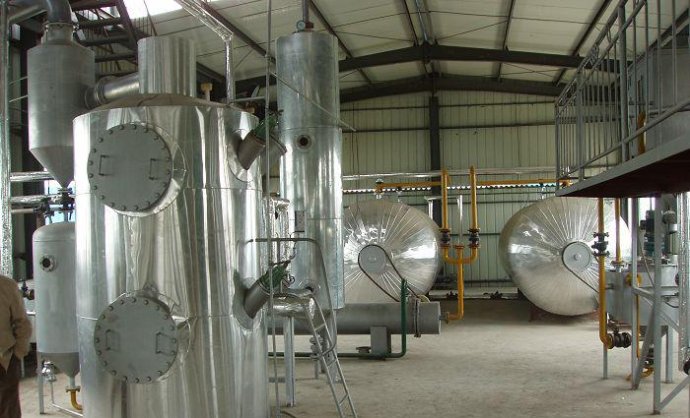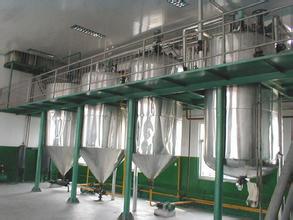
Products
- Pretreatment Section of the Oil Mill Plant
- Pressing Section for Oil Mill Plant
- Solvent Extraction Plant
- Oil Refining Plant
- Filling Section of the Oil Mill Plant
- Oil Modification Plant
- Seed Processing Plant
- Small Oil Production Line
- oil press
- YZS-30 Sesame Oil Pressing Machine
- YZS-68 Soya Oil Press
- YZS-80 Canola Oil Press
- YZS-95 Sunflower Seed Oil Press
- YZS-100 Oil Expeller Press
- YZS-120 Oil Pressing Machinery
- YZS-130 Screw Oil Press
- YZS-160 Oil Seed Press
- YZS-80A Combined Oil Press
- YZS-95A Automatic Oil Press Machine
- YZS-100A Automatic Oil Expeller
- Steel Silo
- Face Mask
Useful Links
- Oil Production Process 5S Groundnut
- Physical Refining Process Of The Edible Oil Refining Machine
- Cottonseed Oil Processing Equipment
- Something About Sunflower Oil Extraction Machine
- Something About Soybean Oil Refining Machine
- Something About Edible Oil Solvent Extraction
- Rice Bran Oil Extraction Equipment
- Soybean Oil Refining Equipment
Latest News
Apr 15, 2015
Process of Edible Oil Refining Equipment


With the continuous development of the technology of edible oil refining equipment, currently five or more “continuous” oil refining processes are widely used at home and abroad, namely “hydration degumming, alkaline deacidification, adsorption decolorization, winterization dewaxing, and high-temperature deodorization”.
Degumming
The so-called "hydration" refers to the use of a certain number of electrolytes, added to the oil, so that precipitation of water-soluble impurities, and the separation of oil and a method of removing impurities.
The electrolyte used in hydration degumming is the hydrophilicity of phosphoric acid and phospholipids, which allows the colloid to swell and condense to form a relatively large “hydrate”, thereby achieving the purpose of purification. Proteins, viscous substances, and trace metals that are combined with phospholipids will also be removed together.
Deacidification
"Alkaline refining" is a method of neutralizing free fatty acids with an alkali and simultaneously removing some of the other impurities. Alkali deacidification is the use of alkali liquor (NaOH solution) to neutralize the high fatty acids in the olein to precipitate soap after soap formation.
The resulting soap has a strong adsorption capacity, and it can separate a considerable amount of other impurities such as solid particles, proteins, gums, pigments, etc. into the soapstock.
Decolorization
Commonly used oils come in different colors because the oils themselves contain different pigments. Most of the colors are non-toxic, but they affect the appearance of the oil.
Therefore, to produce high-grade oil products, such as salad oils, cosmetic oils, and light-colored paints, it is necessary to decolorize oils and fats.
Adsorption and decolorization of oils and fats is currently the most widely used decolorization method. The use of certain substances that have a strong selective adsorption effect on pigments (such as activated clay, active surface, etc.) can absorb pigments and other impurities in the oil under certain conditions, thereby achieving the purpose of decolorization.
The adsorbent-treated oil not only achieves the purpose of improving the oil color and removing the gum, but also effectively removes some trace metal ions in the oil. This provides good conditions for further refinement of the oil (deodorization, etc.).
Dewaxing
Compared with common vegetable oils, rice bran oil contains not only high acid value but also 2%-7% of wax. Waxiness makes the transparency and digestion and absorption rate of the oil products drop, and makes the taste and palatability of the gas worse, thereby reducing the edible quality and nutritional value of the oil.
Therefore, removing the wax from the oil and extracting the wax can improve the nutritional value of the edible oil and fat and the quality of the oil and fat food.
The dewaxing process of winterization is based on the difference in the freezing point between the wax and the saturated fat and the liquid fat, and the saturated fat and wax are crystallized by lowering the oil temperature, and then the solid fat (end) is separated by mechanical or random agent method. Liquid oil, so that the refined oil standards.
Pure triglyceride esters are odorless, but the oils obtained with different manufacturing processes have their own special smell.
The various odors in oils and fats are commonly referred to as odors. Some of these odors are natural, and some of them are new to oil production and processing. Deodorization of fats and oils can not only remove the odor substances in the oil and improve the flavor of the edible oil, but also improve the stability, color and quality of the oil.
Therefore, deodorization is highly valued in the production of high-grade oil products and is one of the main processes of edible oil refining equipment.
Deodorization of oil and fat is the process of removing odor substances by using steam distillation under high temperature and vacuum conditions to utilize the difference in boiling point between odor substances and triglyceride in oils and fats.
The above are the major steps and process descriptions of the process for edible oil refining equipment.
Henan Kingman M&E Complete Plant Co., Ltd © 2013


